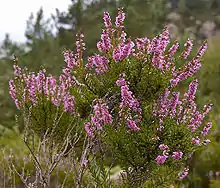Erika (song)
"Erika" is a marching song used by the German military. The song was composed by Herms Niel in the 1930s, and it soon came into usage by the Wehrmacht, especially the Heer and, to a lesser extent, the Kriegsmarine.
| "Erika" | |
|---|---|
| Song | |
| Language | German |
Title
"Erika" is both a common German female name and the German word for heather (see also Erica), a common German wildflower.
Origins
The lyrics and melody of the song were written by Herms Niel, a German composer of marches. The exact year of the song's origin is not known; often the date is given as "about 1930",[1] a date that, however, has not been substantiated. The song was originally published in 1938 by the publishing firm Louis Oertel in Großburgwedel. It had been popular prior to the start of World War II.[2]
Niel, who joined the NSDAP in early May 1933 and became a leading Kapellmeister at the Reichsarbeitdienst, created numerous marches. Songs like these were useful in keeping German soldiers entertained and was also used as a morale booster.
Music
After each line, and before each time the name Erika is sung, there are three beats pause, which are filled by the kettledrum, or stomping feet (e. g. of marching soldiers), shown as (xxx) below.
Lyrics and translation

Auf der Heide blüht ein kleines Blümelein (xxx) |
On the heath, there blooms a little flower (xxx) |
References
- "Als ich gestern einsam ging ..." by Leonore Böhm, Der neue Tag (Grafenwöhr), 17 October 2008. Retrieved 18 October 2014. (archived, (Seite 4 [page 4])) (in German)
- Berszinski, Sabine (2000). Modernisierung im Nationalsozialismus? : Eine soziologische Kategorie und Entwicklungen im deutschen Schlager 1933–45 [Modernization under National Socialism? : A Sociological Category and Developments in German popular music 1933–45] (magister thesis) (in German). Institut für Soziologie [Beteiligte Körperschaft], Albert-Ludwigs-Universität Freiburg. p. 54.
- "Auf der Heide blüht ein kleines Blümelein (Erika)", volksliederarchiv.de
External links
- "Erika", lyrics and recordings, ingeb.org
